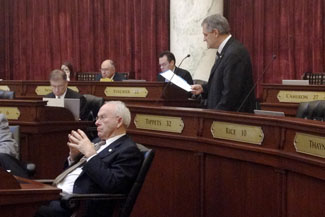The Idaho Senate passed the Health Insurance Exchange 23-12 Thursday, sending it to Gov. C.L. “Butch” Otter for approval.

Emily Johnson | Argonaut
Sen. John Tippets, right, from District 32 debates the Health Insurance Exchange bill March 21. The bill was passed 23-12.
Sen. Sheryl Nuxoll from District 8 said the vote on HB 248 would either be the start of slavery or freedom.
“Due to the way the Affordable Care Act was written, it depends on the existence of a state exchange to impose the tax penalty. The state has no control over this,” Nuxoll said.
She said without a state exchange in Idaho, there are no penalties to Idahoans.
“We have the right to build the store, but we have absolutely no control over the products that we’re going to sell,” Nuxoll said. “So there’s no real flexibility.”
Nuxoll said forcing Idahoans to buy insurance through a state exchange is an attack on religious freedom and conscious rights, since there is no opt-out of preventive services such as Plan B or Ella in the required health benefit plan set up by the Department of Health and Human Services.
Nuxoll said because of Idaho’s abortion opt-out language, passed in 2011, the Attorney General’s legal opinion states that under a state or federal exchange, insurance companies may not provide coverage for surgical abortions or RU-486, but under a state exchange, it will be required to provide for Plan B and Ella, since they are considered contraceptives.
“But Plan B and Ella are also potential abortifacients since they can prevent the implementation of a fertilized egg, an unborn baby,” Nuxoll said.
Sen. John Tippets from District 32 said a state-run exchange is likely to be cheaper than federal. He said the federal exchange is looking to charge 3.5 percent and the state exchange will be significantly less.
“I think history will show, typically the state can administer these programs for less money than our federal government,” Tippets said.
In addition to possibly being cheaper than a federal exchange, Tippets said a federal exchange may reduce the number of products that are available as well as the number of carriers.
“One of the benefits is that our state exchange will be an open exchange, anyone who meets the criteria can bring insurance product to the exchange and sell it through the exchange as well as on the open market,” Tippets said. “We’re not sure that that will be the case with the federal exchange.”
According to the fiscal note of HB 248, initial costs would be funded through federal grants, which amount to approximately $30 million. After the first year of operating, it will be self-sustaining, using fees imposed by carriers and other users in the exchange. The fiscal note said businesses and individuals will not be taxed directly.
Sen. Steve Vick from District 2 said Idahoans would rather deal with people in Idaho than at the federal level.
“When I look through the history of this country, to see what’s been done to change bad laws, I don’t see examples. I didn’t find examples where we changed a bad law by complying with the law,” Vick said. “This strategy that I see here of resisting by complying is new and I honestly don’t expect it to have much success.”
Vick said when something is unjust, people don’t get much credit for making a bad thing better.
“If you want Obamacare to run in the best possible way for people in Idaho, you may want to vote for the state exchange, because we very well may do it better,” Vick said. “But if you want to reverse Obamacare, to put an end to it and encourage others to fight Obamacare, then you need to vote no.”
Otter was a guest on a Fox Business segment known as Cavuto last week, talking about running a state exchange as opposed to a federal exchange that many other states are defaulting to.
“The in-game here for the president is a single-payer system. Now how much easier to switch all 50 states to a single-payer system if you start out with 26, 27 or 28 that are all on the same system,” Otter said. “Now all of those that opt not to do it for the state but to do it for the federal government commemorative, they’re all going to be on the same system.”
Otter said Idaho has one of the lowest premium healthcare costs in the nation.
“I think we should have 50 different plans so that we could truly become the laboratories of healthcare for the future,” Otter said.
When it comes to the federal exchange, Otter said that defaulting to a federal system is the worst the state will end up with.
“If I can do anything in negotiations, flexibility or waivers to improve it along the way, maybe I can get something better,” Otter said.
The bill will be sent to Otters desk for approval, and will begin Jan. 1, 2014.
Emily Johnson can be reached at [email protected]
